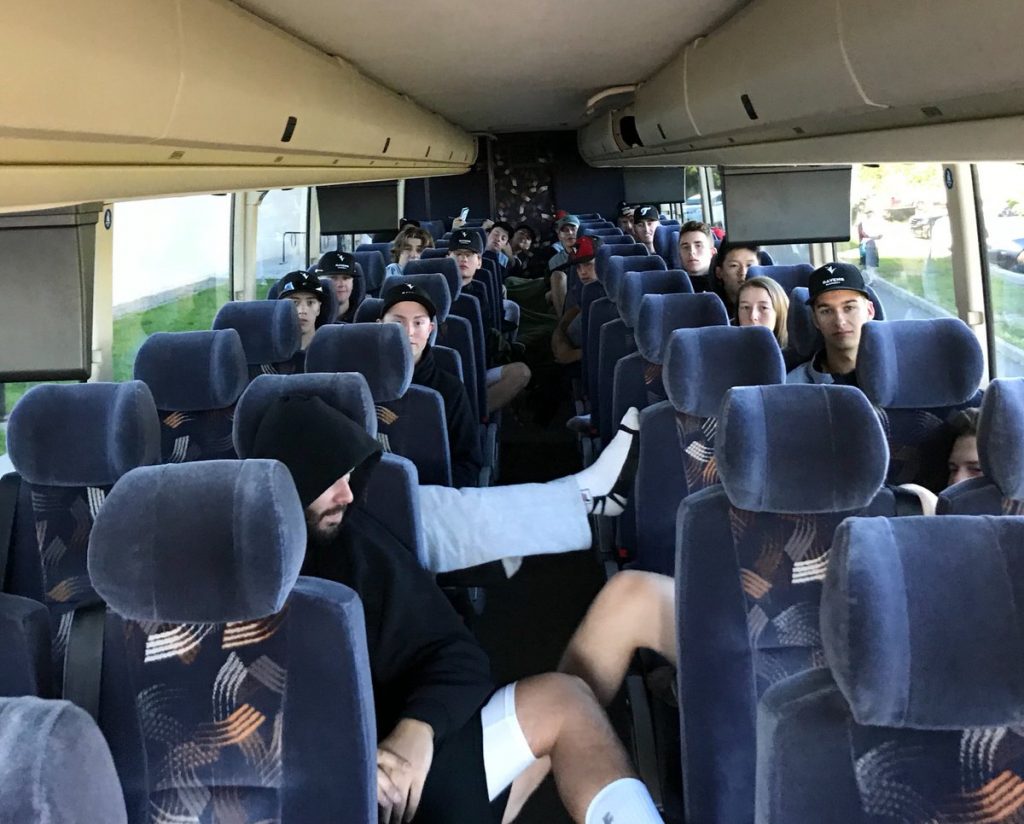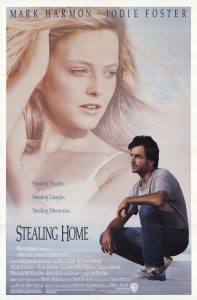Travel in the minor leagues
During my long career as a minor league play-by-play broadcaster, I was often met with two questions when I would tell strangers what I did for a living: “Oh, so you’re the guy we hear over the loudspeaker when we go to the games,” to which I would always say, ” Uh, actually, no. I call the games on the radio. I’m the play-by-play guy. You’re talking about the stadium public address announcer.” The other question, though not as frequent as the former, was, “So, do you get to fly on all your road trips?” For most of my career, the answer was no, aside from one season spent in the Triple-A Pacific Coast League, in which case we did fly almost exclusively.
Only those who have played the game or served as a broadcaster in the industry can truly appreciate – if that’s even the correct term – the exhausting toll that travels in the minor leagues can exact on one’s mind and body.

Now, depending on which league you worked in, bus travel could be as simple as boiling a pot of water or as grueling and painful as getting your wisdom teeth pulled without novocaine.
The California League and Florida State League were arguably the easiest bus leagues. Nothing was more than four or five hours away, and most trips were within a couple of hours. It was just enough time to finish some prep work and still feel human when you arrive at your destination. Those leagues were outliers.
Travel in the minor leagues was not as enjoyable if you worked in the Pioneer League, South Atlantic League, or the Texas League (South Division, in particular). There, you would endure some trips that stretched well beyond 10 hours and others that were five, six, or seven hours. There’s a reason they call those trips kidney thumpers. There would be many days when you boarded the bus as a healthy twenty-something or thirty-something and arrived feeling as though you were 85 with two arthritic knees and a hip replacement that didn’t take.
There’s also a unique way to measure time on bus trips. Rather than calculating a journey by time, movies often measure the length of road trips. Yes, movie watching is pretty standard for bus travel in the minor leagues. You could gauge the distance of a trip by how many movies you could squeeze in until you reached your destination: “Yeah, this is about a four-movie ride,” or, “Yippee, we’ve got a two-movie trip, fellas!” A one or two movie trip was like finding a Willy Wonka golden ticket in your chocolate bar.
When it came to movies, there was usually one player on every team who was the designated flick-picker. His job was to load up on enough DVDs to cover the round trip. If you’re traveling eight hours, you can probably imagine that the flick-picker role came with weighty responsibilities. Sometimes you got lucky, and your flick dude was a regular Siskel and Ebert. You could count on having a plethora of good films to watch while killing time. It helped to take your mind off your aching back and kidneys. Other times you might get a guy who wouldn’t know a good movie if it came up and hit him in the earflap of his batting helmet. Most of the time, the designated flick-picker did a decent job of providing entertainment.
Sometimes, the club manager would have a say in the selection of movies, though in my personal experience, that wasn’t often the case. I remember a fellow broadcaster telling me about a particular manager of his club who was the absolute authority on deciding which movies would be viewed on bus trips, which boiled down to one genre: B-horror films. Talk about making travel in the minor leagues even more appalling.
There was one time I recall when a manager insisted on a particular movie for a trip. Former major league infielder, Rich Dauer, was the skipper of our Double-A club many years ago.

He had retired from playing in the late ’80s and soon after took a job managing the Single-A team in San Bernardino, California. At the time, actor Mark Harmon was a co-owner of the club. Harmon got Dauer a bit part in his movie, Stealing Home, which also featured Jodie Foster. It’s a coming-of-age baseball movie about a failed ballplayer.
For our final road trip one season, Dauer decided he wanted to have a little fun with his players and play the movie during one of our shorter excursions. Remember that coming-of-age romantic dramas are not exactly at the top of a ballplayer’s list, and our boys weren’t thrilled with the selection. player, played by Harmon. In the end, Harmon’s character, by now in his 30s, joins a minor league baseball team that just so happens to be managed by Dauer, who didn’t have an actual name in the flick.
The best part was at the movie’s end when Dauer had his cameo appearance.
He had been so excited to see the players’ reaction when he showed up on the screen, except none of the players recognized him. After all, the movie debuted about 25 years earlier when Rich had a little more hair and fewer wrinkles.
Rich probably replayed his on-scene appearance two or three times before one of the players near the front of the bus finally asked, “Richie, is that you?” At that point, everyone started to catch on as laughter and shouting began to fill our 45-foot sardine can. We must have watched that scene seven or eight more times.
The absolute worst part about bus travel in the minor leagues is the futility of trying to sleep on those long overnight trips. Have you ever tried to sleep on a bus crammed with 35 to 40 people?
I’m one of those who has always had trouble sleeping in cars, buses, airplanes; you name it. The only way I can sleep is by lying down. If you’re on a bus, that’s comfortable for about an hour. If the row across from you isn’t empty, you can’t stretch out your legs, so you have to turn yourself into a circus contortionist freak. Even if the row next to you is empty, it’s still not entirely pleasant. I’d love to know who thought it was a good idea to make seats where the inside edges of each one curve up?
What’s wrong with two flat seats? You may as well try sleeping on a roll of quarters. Don’t get me started on those immovable seat belt buckles that make your leg feel like someone is giving you a continuous charley horse or sticking you in the back with a hot poker.
Often, some players will bring one of those roll-up foam mattress pads on the bus and stretch out on the floor. The worst part is when one of them decides to make his bunk on the floor directly next to your seat. Now you’re in trouble, mainly if you can’t stretch your legs across the next row of seats because they’re occupied. That presents a conundrum that would even be challenging for Daniel Browning Smith. Good luck!
That also brings me back to the movies. Have you ever attempted to fall asleep at 2 a.m. with a movie playing and the volume set to ear-bleed level? I eventually wised up and started bringing earplugs in my backpack. That helped mute the sound from the level of a jet engine to that of a chainsaw. If you were fortunate, the movies might cut off around 1 a.m., which would allow you to focus on the seat belt buckles that make your back feel like it was getting an epidural, or on that roll of quarters beneath your leg.
One other warning relating to bus travel in the minor leagues: DON’T attempt to use the bathroom in the middle of the night unless you’re Peter Parker, Peter Pan, or happen to be sitting in the back of the bus.

Trying to maneuver around a maze of stretched-out legs and bodies strewn on the floor makes the World’s Toughest Mudder competition look like a game of first-grade hopscotch.
If you want to ensure that you tear a hamstring, suffer a Grade 3 groin strain, or blow out a knee, try getting from the front of the bus to the bathroom in the middle of the night.
Early in my career, I made the rookie mistake – multiple times – of not monitoring my fluid intake before hitting the bus for extended overnight trips. That was a hard lesson to learn. I was obviously a slow learner. The key to survival is taking small sips of water, just enough to keep you from getting completely dehydrated.
If you like to have a couple of beers before boarding the bus after the game, proceed at your own risk. If you want to tip back a few during a trip, you either have ice water in your veins or a bladder the size of Texas.
I think that most major league organizations now disallow alcohol consumption on bus trips, but that wasn’t always the case.
So there you go. Now, if you ever run into me, you know that I wasn’t the PA guy at the local yard. And no, travel in the minor leagues is less than glamorous. However, if you ask me how I enjoyed my years in baseball, I’ll regurgitate the answer I give everyone – “Hey, I got paid to watch and talk about games all summer. How bad can that be?”
Please feel free to leave a comment, like/dislike, or share the post if you wish. Just click on the comment button below to do so. As always, thanks for reading.





